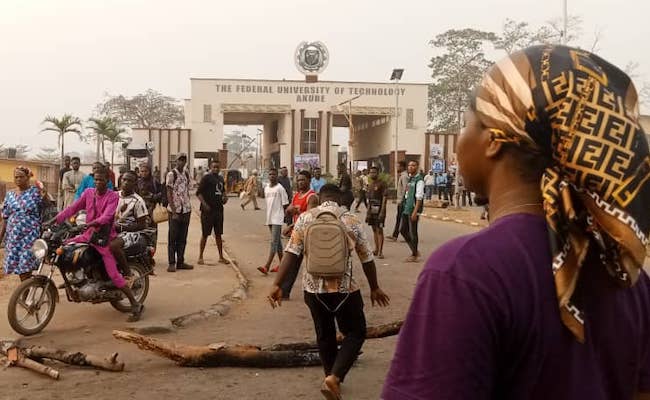Gist
Protest Rocks FUTA Over Incessant Robbery Attacks

Students of the Federal University of Technology Akure, Ondo State, on Friday, took to the streets and expressway to protest the ongoing robbery attacks against them, especially those living off the campus of the institution.
Naija News learnt that the protesters also barricaded the busy Akure -Ilesa Road, causing gridlock on the expressway, while chanting various solidarity songs.
Speaking to journalists, students said they staged a protest to call the attention of the management of the institution, the government, and the security agencies to take action and save them from the activities of the bandits.
Speaking on the development, the state Police Public Relations Officer, Funmilayo Odunlami, said men of the command had been deployed in the area to ensure the protest was not hijacked by hoodlums.
Protesters Storm National Assembly Over Sachet Alcohol Ban
Meanwhile, a notable coalition of civil society organizations made their grievances known on Wednesday by staging a protest at the National Assembly over the National Agency for Food and Drugs Administration and Control‘s (NAFDAC) recent prohibition on the sale of alcoholic beverages in sachets.
The protest, orchestrated by the Coalition Against Economic Saboteurs, saw participants bearing placards with the message, ‘Let The Poor Live,’ signifying their opposition to the ban.
Adam Matazu, speaking on behalf of the coalition, vehemently criticized the decision by NAFDAC, particularly targeting the agency’s Director-General, Prof. Moji Adeyeye, for what he described as “anti-people policies.”
The protestors demanded the immediate removal of Prof. Adeyeye, accusing her of implementing measures detrimental to the well-being of the less privileged and the economic landscape.
The groups argue that the ban on sachet alcoholic beverages could precipitate adverse economic consequences, potentially leading to the closure of industries engaged in the production of these items.
They contend that such a policy would not only exacerbate the existing challenges within the Nigerian economy but also jeopardize the livelihoods of those dependent on the sector for employment and income.




